2013 Annual Merit Review Awards
Each year, at the Annual Merit Review and Peer Evaluation Meeting, the Hydrogen and Fuel Cells Program presents "Program Awards" for contributions to the overall efforts of the Program, and "Sub-Program Awards" to recognize achievements in specific areas. This year, the Hydrogen and Fuel Cells Program also presented two "Special Recognition Awards."
Special Recognition Awards from the DOE Hydrogen Program
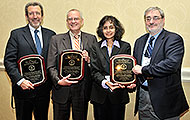
L to R: Morry Markowitz, FCHEA; Jeffrey Serfass, former NHA; Sunita Satyapal, Fuel Cell Technologies Office (FCTO); Robert Rose, former U.S. Fuel Cell Council.
The U.S. Fuel Cell Council, the National Hydrogen Association, and the Fuel Cell and Hydrogen Energy Association
This award recognizes the outstanding collaboration and commitment demonstrated by leaders of the former U.S. Fuel Cell Council and National Hydrogen Association in coming together to create a new and unified fuel cell and hydrogen industry stakeholder association, the Fuel Cell and Hydrogen Energy Association (FCHEA).
In 1998, Robert (Bob) Rose founded the U.S. Fuel Cell Council—the previous globally recognized trade association of the fuel cell industry—and he has demonstrated outstanding leadership in pioneering the way for the new organization, FCHEA. Bob is also the Executive Director of Breakthrough Technologies Institute, an independent non-profit organization that advocates for environmentally beneficial technologies, with a major focus on fuel cells. He and his team member Jennifer Gangi are well known to the global community for Fuel Cells 2000, a non-profit educational resource supported by the Department of Energy for the last two decades, which manages numerous databases and provides technical and market information on fuel cell technologies worldwide. In a career spanning more than 35 years in Washington, D.C., Bob has served in senior communications and policy positions in the U.S. government, and as an advisor to state and regional governments, non-profit organizations, and the private sector. He has been a constant supporter of the U.S. Department of Energy and a strong advocate for fuel cell technologies throughout the years.
Jeffrey Serfass was the founding president of the former National Hydrogen Association, serving for more than 22 years to advance the field of hydrogen energy. Jeff is also the founder and executive director of the Hydrogen Education Foundation, where he and his son Patrick are well known among the community for their outstanding support of student education and outreach, particularly with their internationally known annual Hydrogen Student Design Contest, which has been supported by the U.S. Department of Energy for many years. In 2002, Jeff established the Partnership for Advancing the Transition to Hydrogen (PATH), a 501(c)(6) organization, to spread a consensus vision of a global hydrogen economy and facilitate its implementation. As Jeff's work expands into other energy technology areas, he continues to be a strong advocate for hydrogen energy at numerous venues, ensuring that hydrogen and fuel cells are well represented.
The Department recognizes the progress made by FCHEA in the two years since it was established and acknowledges its first executive director, Ruth Cox, for her outstanding determination, passion, and single-mindedness as a trailblazer for the organization. As a seasoned high-technology marketing executive, Ruth helped shape the organization during a challenging time, calling on her global experience in corporate strategy and business development. She currently serves as the regional administrator of the Pacific region for the U.S. General Services Administration, overseeing a workforce of over 800 and a budget of nearly $1 billion. The U.S. Department of Energy commends her dedication, leadership, and ability to make difficult decisions to strengthen FCHEA in its formative year.
Finally, during the last year, FCHEA has made significant advances under the leadership of its current Executive Director and President, Morry Markowitz, who has a long history in the automotive industry and in trade association management, including at the Edison Electric Institute and the Association for International Automobile Manufacturers. Morry has worked tirelessly to unify and strengthen FCHEA's membership, particularly with the launching of H2 USA, a public-private partnership just announced by the Department of Energy in May 2013. Through the efforts of Morry and his team, FCHEA has led numerous advocacy programs on Capitol Hill, at the Department of Energy, at the Department of Defense, and at other government agencies and stakeholder events throughout the country.
This award honors not only the leaders of the previous and current hydrogen and fuel cell trade associations but all its stakeholders and members for moving beyond their separate purviews and coming together for the benefit of the entire industry.
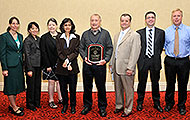
L to R: Kathi Epping-Martin, FCTO; Donna Ho, FCTO; Nancy Garland, FCTO; Sunita Satyapal, FCTO; Walter Podolski, ANL; Steve Chalk, Office of Energy Efficiency and Renewable Energy; Dimitrios Papageorgopoulos, FCTO; Jason Marcinkoski, FCTO.
Walter Podolski, Argonne National Laboratory
With the announcement of his retirement, the DOE Hydrogen and Fuel Cells Program accords special recognition to Walter Podolski for his distinguished career and his valuable contributions to the DOE Hydrogen and Fuel Cells Program over the past two decades. In 1992, Walt became involved with the technical management of DOE-supported research and development of polymer electrolyte membrane (PEM) fuel cells and phosphoric acid fuel cells for transportation applications. As a technical advisor, his broad knowledge and experience have proven irreplaceable in his review and assessment of the progress of industrial organizations and universities in developing early PEM systems, and more recently, key fuel cell component technologies. He has served on the Hydrogen Storage and Fuel Cell Tech Teams since their inception, and he continues to provide valuable input to the Program's multi-year strategic R&D planning. Over the years, Walt's technical expertise and keen advice—drawing on his extensive experience with hydrogen and fuel cells—have been vital assets to the entire program.
DOE Hydrogen and Fuel Cells Program Sub-Program Awards, recognizing outstanding technical contributions:
Hydrogen Production
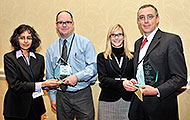
L to R: Sunita Satyapal, FCTO; Kevin Harrison, NREL; Erika Sutherland, FCTO; Chris Ainscough, NREL.
Chris Ainscough and Kevin Harrison, National Renewable Energy Laboratory
This award recognizes Kevin Harrison and Chris Ainscough of the National Renewable Energy Laboratory (NREL) for their exemplary dedication and commitment to research and analysis of integrating wind power and hydrogen production. The NREL Wind-to-Hydrogen team—through noteworthy partnerships with Xcel Energy, Proton OnSite, Giner Inc., and other industry partners—has produced valuable data on electrolyzer performance and first-of-its-kind analysis to characterize the performance and costs of integrated renewable electrolysis systems. Their work has provided essential technical groundwork for further investigation of producing hydrogen from variable renewable sources such as wind and solar, and for the use of hydrogen for energy storage. They have demonstrated their dedication on multiple occasions—most notably in their efforts to meet DOE milestones by working round the clock to overcome unforeseen weather, equipment supply, and technical challenges. In addition to their many technical contributions, Kevin and Chris have also been proactive in their outreach on behalf of hydrogen and fuel cell technologies, providing information and technical assistance to numerous individuals, industry groups, and state organizations.
Hydrogen Storage
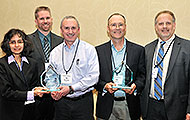
L to R: Sunita Satyapal, FCTO; Jesse Adams, FCTO; Phillip Parilla, NREL; Karl Gross, H2 Technology Consulting; Ned Stetson, FCTO.
Philip Parilla, National Renewable Energy Laboratory, and Karl Gross, H2 Technology Consulting
This award recognizes Philip Parilla of the National Renewable Energy Laboratory (NREL) and Karl Gross of H2 Technology Consulting for their vital contributions to standardizing measurement of the hydrogen storage properties of materials. Their work has helped reduce erroneous results from inappropriate techniques and experimental errors. Gross produced the Recommended Best Practices for the Characterization of Storage Properties of Hydrogen Storage Materials, an invaluable document that defines key material properties relating to hydrogen storage and provides guidance on how to measure those properties. This publication has been a valuable asset to new researchers and to established researchers looking to expand their measurement capabilities and ensure reliability and quality in their measurements. Parilla, in addition to working with Gross on the Best Practices document, has developed a thorough understanding of the intricacies and sources of error in hydrogen sorption measurements. This understanding and his ability to educate other researchers on how to properly carry out accurate and precise hydrogen sorption measurements have dramatically improved the reliability of results produced by researchers within the hydrogen storage R&D community.
Fuel Cells
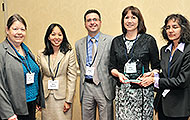
L to R: Nancy Garland, FCTO; Donna Ho, FCTO; Dimitrios Papageorgopoulos, FCTO; Karren More, ORNL; Sunita Satyapal, FCTO.
Karren L. More, Oak Ridge National Laboratory
This award recognizes Karren L. More of Oak Ridge National Laboratory (ORNL) for her outstanding achievements in leading ORNL's project on Microstructural Characterization of Fuel Cell Materials and in her role as a subcontractor on multiple DOE-funded fuel cell R&D projects. For more than 10 years, More's extensive experience with a variety of state-of-the-art electron microscopy techniques has enabled unprecedented levels of characterization of a variety of materials used in catalysts, supports, ionomers, gas diffusion layers, and membranes. She has collaborated on numerous fuel cell durability and aging studies with other national laboratories (including Los Alamos National Laboratory, Brookhaven National Laboratory, Argonne National Laboratory, and the National Renewable Energy Laboratory) and leading manufacturers (including 3M, General Motors, Ballard, AFCC, Nissan, Nuvera, and UTC). Her work correlates microstructural/compositional observations with accelerated stress test protocols and "real world" fuel cells, especially related to catalyst coarsening and migration, carbon corrosion, and membrane degradation. More's work is well known and vital to the entire fuel cell community, helping developers improve durability, cost, and performance of state-of-the-art polymer electrolyte membrane fuel cells.
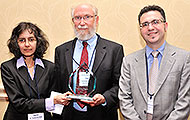
L to R: Sunita Satyapal, FCTO; Frederick Wagner, General Motors (retired); Dimitrios Papageorgopoulos, FCTO.
Frederick T. Wagner, General Motors (retired)
This award recognizes Frederick T. Wagner, who recently retired from General Motors, for the numerous contributions he has made to the DOE Hydrogen Program. Wagner's career spans 30 years as a research chemist specializing in fuel cell electrocatalysis and durability. He started his career at Lawrence Berkeley National Laboratory as a post-doc working with Phil Ross before joining the General Motors Research Lab. He served as industry co-chair of the Fuel Cell Tech Team of the FreedomCAR and Fuel Partnership (the predecessor to the US DRIVE Partnership), he provided insightful technical feedback on DOE fuel cell projects at many annual merit reviews, and more recently he served as principal investigator on a project that produced dealloyed catalysts that met DOE's mass activity and durability targets. Through his exceptional dedication, his professional expertise, his leadership in DOE-sponsored reviews and workshops, and his service on the Fuel Cell Tech Team, Wagner has provided a large body of materials performance measurement guidelines and targets, which have greatly improved the ability of suppliers and universities to properly benchmark newly developed fuel cell materials. This has been invaluable to the scientific community and to the commercial development of polymer electrolyte membrane fuel cells.
Manufacturing R&D
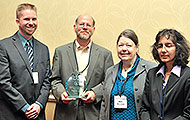
L to R: Jesse Adams, FCTO; Emory De Castro, BASF; Nancy Garland, FCTO; Sunita Satyapal, FCTO.
Emory De Castro, BASF Fuel Cell, Inc.
This award recognizes Emory De Castro of BASF Fuel Cell, Inc. for his efforts to develop novel methods to reduce the cost of fabricating gas diffusion electrodes (GDEs) for membrane electrode assemblies (MEAs). De Castro has supported the Manufacturing R&D and Fuel Cell efforts in the DOE Hydrogen and Fuel Cells Program for many years, and his manufacturing R&D project at BASF has made remarkable progress over the last three years. The BASF team has reduced labor costs to manufacture GDE cloth by 75%. The team has increased throughput by 400% and nearly doubled yield. This newly developed GDE material is an integral part of BASF's new Celtec P1100W high temperature PEM fuel cell MEA product. The team has transitioned from selectively picking high performers to a "six sigma" product that provides improved cell performance. De Castro's recent manufacturing work on paper-based GDEs has resulted in a 30% cost reduction and a significant reduction in platinum loading compared with cloth-based GDEs, with no loss in performance.
Technology Validation
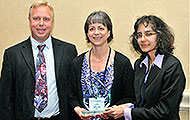
L to R: Jason Marcinkoski, FCTO; Leslie Eudy, NREL; Sunita Satyapal, FCTO.
Leslie Eudy, National Renewable Energy Laboratory
This award recognizes Leslie Eudy of the National Renewable Energy Laboratory (NREL) for the valuable contributions she has made in support of the DOE Hydrogen Program's technology validation efforts over the last 10 years. Leslie has developed strong relationships with the Department of Transportation (DOT) Federal Transit Administration and numerous transit authorities that operate fuel cell buses. She began at NREL evaluating advanced diesel, hybrid, natural gas, bio-fuel, and fuel cell buses, and she later chose to concentrate her career on fuel cell buses, reporting extensively on their superior fuel economy and emissions reductions. She is acknowledged internationally for her leadership in organizing workshops that have brought together the world's experts on fuel cell bus development and deployment. She is also recognized for publishing six annual reports summarizing the status and progress of demonstrations of fuel cell transit buses in the United States. The DOT, DOE, the California Air Resources Board, and other agencies rely on her expertise for evaluating proposed projects—not only for fuel cell buses, but also for other energy efficiency measures at transit sites.
Safety, Codes and Standards
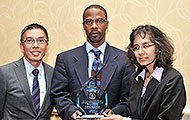
L to R: Nha Nguyen, FCTO; Tommy Rockward, LANL; Sunita Satyapal, FCTO.
Tommy Rockward, Los Alamos National Laboratory
This award recognizes Tommy Rockward of Los Alamos National Laboratory for his outstanding technical contributions to the establishment of the scientific background essential to setting meaningful impurity guidelines for hydrogen fuel quality. Over the past decade, Tommy has diligently supported the effort to harmonize domestic (SAE2719) and international (ISO 14678-2) hydrogen fuel quality standards. Thanks in part to Tommy's efforts, automotive OEMs can now count on consistent hydrogen fuel quality across all of their global markets, as there is now one common set of fuel quality requirements for the hydrogen supply industry to comply with. Tommy's thoughtful, thorough experiments on the effects of various fuel impurities on fuel cell performance were instrumental in guiding these fuel quality standards. Tommy has taken the initiative to expand this work to the area of state-of-the-art low-platinum-loading MEAs, and he continues to work closely with international researchers on the refinement of an international standard for hydrogen quality. Recently, Tommy became chair of the ASTM sub-committee D03.14 and is helping to lead inter-laboratory studies in support of standards for hydrogen used as a fuel for low, medium, and high temperature fuel cells.
Market Transformation
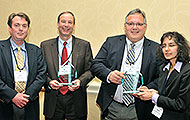
L to R: Pete Devlin, FCTO; Stuart Funk, Logistics Management Institute; Leo Grassilli, Office of Naval Research; Sunita Satyapal, FCTO.
Stuart Funk, Logistics Management Institute
This award recognizes Stuart (Stu) Funk of the Logistics Management Institute (LMI) for his outstanding achievements in the field of hydrogen fuel cell technology demonstration, validation, and deployment, and for his support of the DOE Hydrogen Program's market transformation efforts for the past eight years. Stu led his team to produce a fuel-cell-versus-battery material handling business case based on real-world data, which provided valuable information to both public and private sector entities. Since 2004, Stu has been a key player in joint DOE-DOD efforts to introduce fuel cells into material handling equipment markets. These efforts included the first-ever deployment of fuel cell lift trucks, at the Defense Logistics Agency's most active depot, in Susquehanna, Pennsylvania, where more than 50 lift trucks were deployed over two years in an operational demonstration. A consistent and active supporter of the DOE Hydrogen Program, Stu regularly participates in monthly interagency working group meetings and the DOE Annual Merit Review. Stu's outstanding leadership and professionalism have brought credit to himself, LMI, DOD, and DOE.
Leo Grassilli, Office of Naval Research
This award recognizes Leo Grassilli of the Office of Naval Research for his support of the DOE Hydrogen Program's market transformation efforts over the last 10 years. Leo has effectively communicated the value of fuel cells for warfighter applications and for meeting broader societal needs at a number of high-profile events, including Fuel Cell Seminars and other hydrogen and fuel cell industry events, as well as at Department of Defense energy conferences. In applying his experience and interest in fuel cell technologies, Leo has spurred government representatives to rally around a number of joint initiatives, including the Hawaii Hydrogen Initiative, the Fuel Cell Electric Vehicle Working Group, and the InterFuel Working Group. One of Leo's highest-impact achievements was in organizing and convening the Hydrogen Advanced Vehicle Working Group—the federal component of the Hawaii Hydrogen Initiative. In large part due to Leo's efforts, Oahu now has 16 fuel cell electric vehicles (FCEVs) in operation and three hydrogen stations either in operation or being constructed. Prior to these efforts, Leo also spearheaded key hydrogen infrastructure and FCEV deployments at Camp Pendleton in California.
